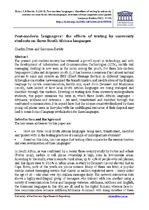Post-modern ‘languagers’: the effects of texting by university students on three South African languages
Abstract
The present post-modern society has witnessed a growth spurt in technology, and with the development of Information and Communication Technologies (ICTs), mobile text messaging (texting) is now seen as the norm among the youth. For these late-modern languagers (Lytra and Jørgensen 2008: 5), it has become a common if not almost natural process to send and receive an SMS (Short Message Service) in different languages. Although some studies have examined the transformation and modification of the English language by mobile communication, hardly any, apart from Deumert and Masinyana (2008), have looked at how local South African languages are being reshaped and modified through this medium. Drawing on texting data from university undergraduate students, this paper examines the ways in which three South African languages – Afrikaans, isiXhosa and Setswana – are used, transformed and modified through this medium of communication. It is argued here that the intense creativity displayed by these young cell phone users as they play with the multilingual resources at their disposal may lead to some form of language revitalisation for these languages.

